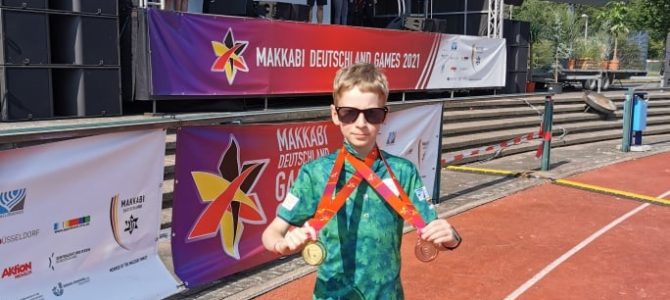I’d like to present a person who, as Lithuanian Makabi president Semionas Finkelšteinas says, performed a small miracle at the recently finished World Maccabiah Games in Israel.
Daniel Šer is the silver medal winner in the junior chess competition. Daniel is 13, but he was playing against 16, 17 and 18-year-olds. A silver medal which just missed becoming gold by a hair, since Daniel collected the same number of points with the gold medal winner from the USA, and according to the rules, a tie like that means other indicators are taken into account, something is always kind of a lottery, and this time it wasn’t in our favor.
It was a great competition, very good results and a very high assessment not just for the medal won, but also because news reached us that the organizers of the competition and the chief referee sent the final results to the International Chess Federation along with the request to present Daniel the title of candidate master for his excellent playing in the competition.
We’ll just have to wait for that and we are judging our chances very conservatively, but this would be yet another WOW and a large cherry on top of the already large cake. It might be interesting to talk about how it all started.
We began playing chess when Daniel was five-and-a-half, because Daniel always like all kinds of math and logic games. Chess was exactly the sort of game we felt would teach patience and sitting still. He was highly active from a very young age and my wife and I were afraid he might not be able to sit still in his chair at school.
So we perceived two goals here. To learn to sit in a chair, and to teach him to think. We began playing at home, his grandfather a little bit, I did a little bit, and later our family friend Josifas Buršteinas introduced us to his neighbor, the chess trainer Gintautas Plungė, who came to our house once per week. We didn’t have any high ambitions, it was simply an interesting pastime which, it seemed to us, Daniel liked.
Later the trainer suggested we take part in children’s chess competitions, but we didn’t have any big wins. We weren’t able to win any prize spots for probably over a year. This is a rather important thing, because if there aren’t good results, there isn’t any enthusiasm either for going on and getting better.
Personally I feel we had done everything right and we just needed to go a little bit further and we’d be in prize territory, but 4th, 5th and 6th place gnawed at our confidence and it was difficult for him as well as the entire support team. The first serious victory was the gold medal of the Lithuanian eight-year-old championship, when Daniel was already 8. We already had almost 2 years of competitive experience behind us, having prepared new things for our competitors and their trainers, and we surprised them as well as ourselves.
Today Daniel has won more than 20 national championships, silver and bronze medals in different disciplines and in different age categories. He has participated five times in the world and European children’s chess championships, four of those times placing among the 20 best players. Three years ago with the Lithuanian national team of 10-year-olds he took fourth place at the European championships. Last year he became the youngest-ever winner of the Lithuanian parliament’s cup for adult players, a prize earlier won by parliamentary speaker Viktorija Čmilytė-Nielsen and her husband Peter Nielsen, along with many other famous Lithuanian chess masters.
So now the silver medal from the Maccabiah Games is truly worthy to be one of the most cherished awards on Daniel’s trophy shelf.
Now I’d like to talk about how we organize our work to achieve these results, and how we do everything we can to make those results even better. First of all, training. The greatest work is performed in summer because there’s lots of free time, and at this time we try to expand our field of knowledge as much as possible. This summer, I think, Daniel spent 3 to 4 hours every day without a vacation, in the morning and for some time in the second half of the day.
During competitions, everything is prepared in the morning, then the competition takes place during the day.
When the school year starts, there isn’t this much time, but we try to find from one hour to one-and-a-half hours every day. The most important thing is to work constantly, because if you decide you need 2 weeks vacation, the level of your playing drops 10 to 15% after that and it takes several weeks to get back to where you were before vacation. After competitions we always take 3-day breaks, but Daniel’s body can no longer go without chess, and, without any urging, he turns on the computer and begins training again.
Over those 7 years we realized systematic work brings results and personal results measured by the computer climb higher. This is reflected in the results from ever more serious competitions.
Thank you to Lithuanian Makabi president Semionas Finkelšteinas for all his help and support and to the entire board of the Lithuanian Jewish Community and chairwoman Faina Kukliansky for their confidence and support. I don’t think our results have been discouraging. I’d like to say Daniel’s sister Karina at the age of six has also won absolutely every competition for eight-year-old girls in Lithuania, and if she so desires–right now she wants to be artist–we might have another serious player for the chess competition at the next Maccabiah Games.


